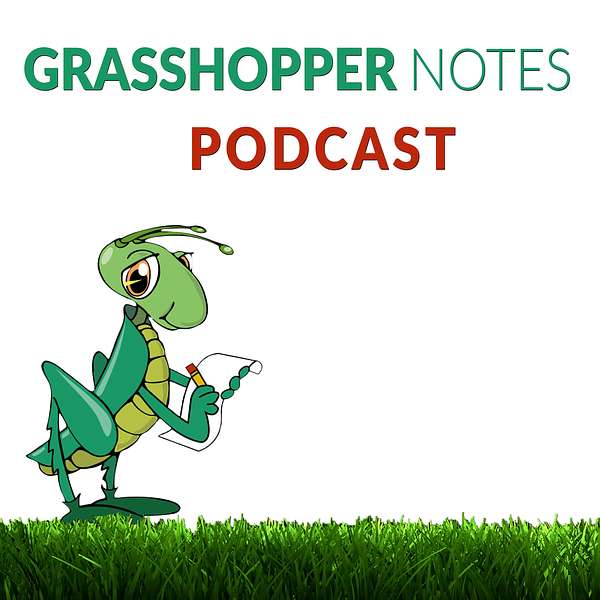
Grasshopper Notes Podcast
The Grasshopper Notes Podcast is hosted by John Morgan the man who has been billed as America’s Best Known Hypnotherapist.
John’s podcasts are a collection of guided meditations and bite-sized, mini podcasts which open you to new ways of thinking, communicating, and responding. You get a finer appreciation of how your mind works and how to use your internal resources to your best advantage.
See a video of John's background at the following link: https://www.youtube.com/watch?v=XbCPd00ok0I
In short, John Morgan is a people helper. Explore this channel and see what he can help you discover.
Grasshopper Notes Podcast
Tolerance
Tolerate has to morph into incorporate for your prejudice to abate. That's the topic of John Morgan's weekly Grasshopper Notes essay for the week of April 17th.
Grasshopper Notes are the writings from America's Best Known Hypnotherapist John Morgan. His podcasts contain his most responded to essays and blog posts from the past two decades.
Find the written versions of these podcasts on John's website: https://grasshoppernotes.com
"The Grasshopper" the part of you that whispers pearls of wisdom that seem to pop into your mind from out of the blue. John's essays and blog posts are his interpretations of these "Nips of Nectar." Others have labeled his writings as timeless wisdom.
Most of the John's writings revolve around self improvement and self help. They address topics like:
• Mindfulness
• Peace of mind
• Creativity
• How to stay in the present moment
• Spirituality
• Behavior improvement
And stories that transform you to a wider sense of awareness that presents more options. And isn't that what we all want, more options?
John uploads these podcasts on a regular basis. So check back often to hear these podcasts heard around the world. Who wants to be the next person to change?
Make sure to order a copy of John's new book: WISDOM OF THE GRASSHOPPER – 21 Days to Creativity. These mini-meditations take you inside where all your creative resources live. And you'll come out not only refreshed but recommitted to creating your future.
It's only $16.95 and available at BLURB.COM at the link below. https://www.blurb.com/b/10239673-wisd...
Also, download John's FREE book INTER RUPTION: The Magic Key To Lasting Change. It's available at John's website https://GrasshopperNotes.com
Tolerance
We learned about story telling in elementary school. The basic structure is beginning, middle, and end. Beginning and end are the bookends; Middle, like an Oreo® cookie, is the sweet spot.
How you start out may have a lot to do with where you end up. Beginnings are where most conditioning is learned. We may carry that conditioning to the very end unless we notice it and choose to do something about it.
Conditioning can be good, bad, or not matter at all. If you were part of the Hatfield or McCoy families, your conditioning to hate the other family may have gone on for over a century. Or if you grew up in a family structure where “proper” manners were taught, you’ll greet all the people you meet with dignity. Now that takes care of good and bad. But what about doesn’t matter at all?
That falls into the category of harmless preferences or patterns. For example, like the way you hang toilet paper, over the top or down the back, ketchup on French Fries, or elbows on the table.
Now if you blanched at any one of those preferences, you’re being held captive by your conditioning. It’s going to take some reconditioning for your preferences not to matter and cease being a wedge between you and another.
The middle is where most reconditioning takes place. We may discover that we don’t have to do it the way our parents did it, and we can learn tolerance they may not have taught us.
My mom used to say, “That’s why they make chocolate and vanilla.” A reconditioned version of her phrase may be, “That’s why Baskin-Robbins exists.”
“Tolerate” is a trigger word for many. To them, it means they have to choke back their discomfort or animus to a different way of doing things. That’s not reconditioning, that’s just temporary repositioning. For forbearance to become a way of life, “tolerate” has to become synonymous with “incorporate.”
If you don’t spend your middle learning to acquiesce, it’s likely that where you end up will be quite the mess.
It’s not too late to rewrite your story. It begins by noticing that your way isn’t the only way, and considering that their way may lead to a brighter day.
Personally, I’m in the middle of this story. It’s still a work in progress for me, not to regress to the conditioning of my way being the only way to dot every “i” and cross every “t.”
All the best,
John
